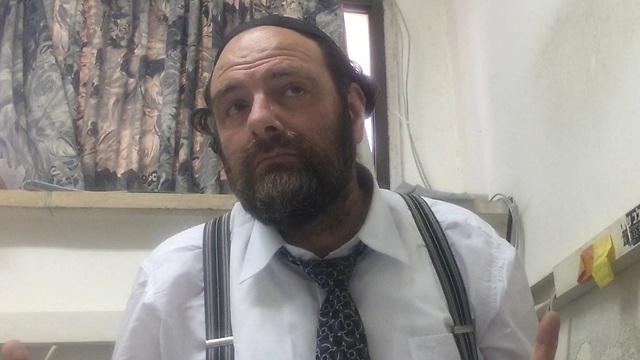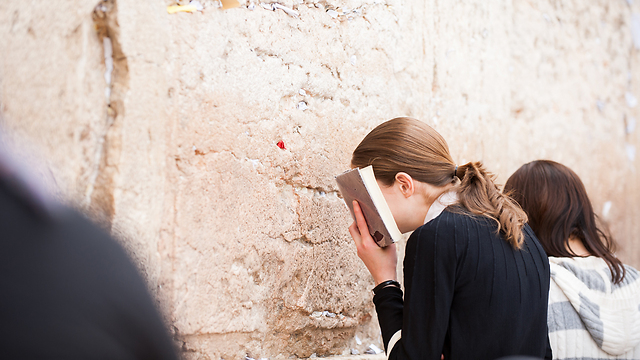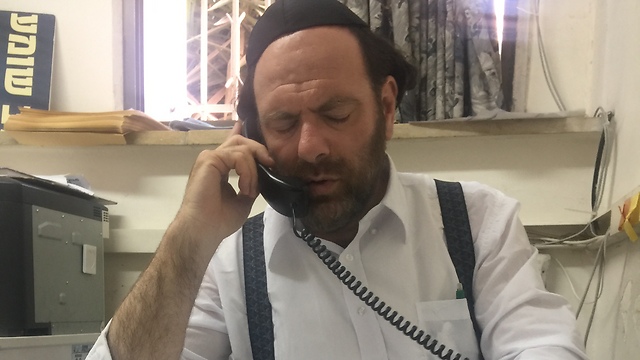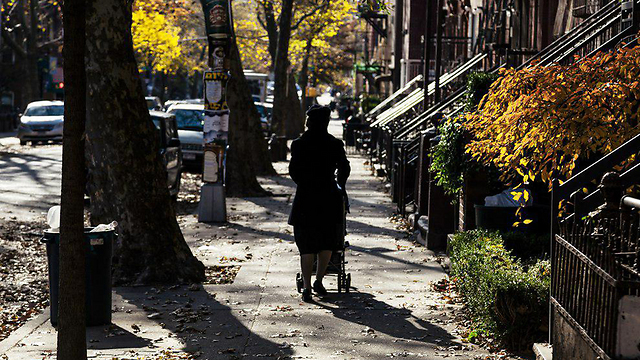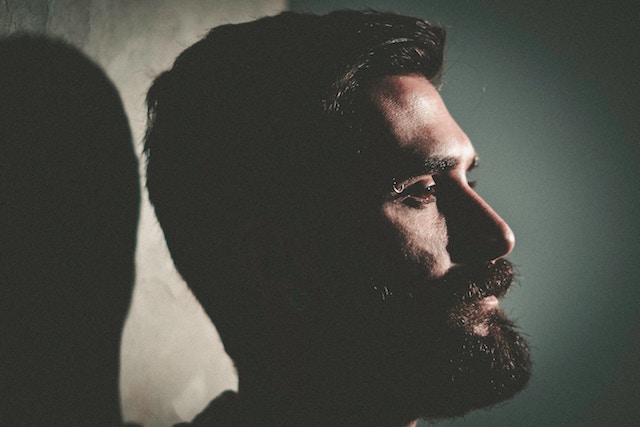Ultra-Orthodox baby trafficker exposed!
The conspiracy of silence has lasted for years because of how ultra-Orthodox society is structured.
The conspiracy of silence has lasted for years because of how ultra-Orthodox society is structured.
Ynet
and Yedioth Ahronoth investigated allegations against Haim Aharon
Yosefi, a well-known figure in the Haredi world, for taking young,
pregnant Haredi woman from Israel to the US to give birth before giving
the child away in an 'adoption' arrangement for a fee; ‘If I tell you
who I'm connected to, it'll blow your mind,’ he tells undercover
journalist.
Haim
Aharon Yosefi—a well-known businessman and figure in the ultra-Orthodox
world—trades in babies. He is a central figure in a network that
allegedly takes young, pregnant Haredi women from Israel to the United
States to give birth before giving the child away in an "adoption"
arrangement for a fee.
In a series of meetings with undercover reporters from Ynet and Yedioth Ahronoth, Yosefi unwittingly provided a rare glimpse behind the curtain, openly divulging how he and his accomplices operate. He also revealed a string of other related activities including the distribution of pills to suppress sexual desire, forging identification documents and more.
Over the last few weeks, Ynet and Yedioth Ahronoth sent "Devorah Leah," a young Haredi woman with a cover story, to Yosefi. "I got pregnant by a married man, and I'm in trouble," Devorah told Yosefi.
During their meetings, Yosefi detailed the journey Devorah would have to endure until her baby is given to an adoptive family. He also offered her payment for the baby and even told her about previous "cases" he "handled."
"Let's say all the expenses concerning you are $50,000, and I'm getting $100,000. Maybe I'm making a profit off of you, but that also means I'm spending $50,000 on you. This is all very problematic and very sensitive. Just so you know, the law says whoever tries to lobby a woman to give her child up for adoption in exchange for favors can get 15 years in prison. It is very criminal," Yosefi told Devorah.
"If I tell you now, Devorah Leah, take $50,000 and I expect to get your fetus, that sounds fine. We are making what is called a fair deal. You get $50,000 and I get the fetus. It doesn't matter if I sell it for a million dollars, or I don't sell it at all. You make out alright for your part. Just know the law is very dangerous. Now I am saying, in principle, in general, I am with you."
The conversations with Yosefi open a window into what he himself calls the "industry" of baby trafficking, involving "a ton, a sea," of similar cases, as he confessed to Devorah.
Approximately six months ago, Yosefi was arrested by police amid an investigation into document forging and providing fictitious exemptions to young ultra-Orthodox men attempting to avoid conscription into the IDF.
"If I tell you who I'm connected to, you'll be blown away," he told Devorah. "Officials in the Interior Ministry, the IDF, the police and different municipalities. I once had an arrangement with an official in the Interior Ministry where I would provide her with interest-free loans and she would help me in return."
Ynet and Yedioth Ahronoth learned of Yosefi's activities through testimony provided by "Esther," who recounted her experiences with him when her infant son was sold to a couple in the United States.
As the investigation progressed, more stories emerged and many of the details were confirmed by Yosefi himself in conversations with Devorah, which were also rife with remarks that bordered on sexual harassment.
Yosefi constantly shifts between the gray and criminal areas. For example, he expressed disappointment when Devorah supposedly approached a doctor through her local clinic for a pregnancy checkup.
"You weren't smart. From now on, never use your real name. I'm sending you to a private physician, and you can say your name is Ruth," he told her. "I've gone with other girls to the doctor as well. You pay and money has no smell. I come with you, put out NIS 500 or 900. I also make sure to give you an identity card with a fictitious number."
When Devorah told Yosefi the alleged father of her baby demanded proof she had an abortion, Yosefi suggested another criminal solution. "Now don't quote me, but you can play a very dangerous card and tell him 'I'm going to the police and telling them you raped me.' At that moment, he'll commit suicide. No one would believe a cute 21-year-old girl raped a 33-year-old man. They will believe you more than him."
Yosefi labeled payments as "royalties." When asked about the precise nature of the royalties, he said, "Beyond the accommodations and flights, I provide you a gift of $10,000 or $20,000. It is criminal, but with God's help, I work very hard to make sure you get royalties too."
Yosefi then outlined the entire birthing process to Devorah, beginning with his accompanying her to the US and the birth itself.
When the time comes, according to Yosefi, he will organize a "host family" in the US, with whom she will live until the birth. "They do it as a good deed," said Yosefi. "They can clothe your body in money."
When asked if he already had a family lined up, Yosefi responded, "Today I know, there are many Haredi families in the world that cannot have children for all kinds of reasons. I have a few, but I have to decide what I want."
Yosefi then proceeded to emphasize to Devorah that he has competitors in the market. "There are all kinds of organizations. But this is very sensitive. I'm talking to you about honesty and fairness. I send you abroad whenever you want. Sometimes I ensure that others do it and sometimes I do it myself. We ensure a host family for you throughout the entire pregnancy and you receive close supervision," he told her.
It costs quite a bit of money. Do I have to work while I'm there in order to finance it?
"All expenses—clothing, makeup, medical insurance, the birth, doctors—you do not have to pay a shekel. If you go tomorrow, you have no expenses for the next six months."
Yosefi also offered additional bonuses, saying, "If you want, we can make efforts to give you some cosmetic treatment, a body design studio. I need to pamper you. This is all in the package. Trips, restaurants, fun. It will all be paid for."
Devorah then inquired about what to tell her parents when she needs to go to the United States and disappear for a period of time, to which Yosefi responded, "I can assist you with this too. I have a bag of excuses."
When Devorah asked about the mental state of girls who have undergone the process and the possibility of seeing the baby after birth, Yosefi responded, "Psychologically, it isn't good for you, because you connect with him. It may be that in your case we will need to organize psychological help."
In the absence of sex education, quite a few ultra-Orthodox girls and women become pregnant, and since the Haredi community is intolerant of such cases, women are forced to find a solution.
Many women willingly cooperate and others believe if they just give birth away from their families and friends, they would be able to raise the child themselves, or at the very least, remain in contact with the child.
The conspiracy of silence has lasted for years because of how ultra-Orthodox society is structured.
No one speaks, because they do not want their children boycotted or condemned. However, as soon as one story comes out, others find the courage to speak out as well.
Why is the process conducted in the United States and not in Israel? For two main reasons.
The first is to distance the wayward girl from the community in order to "protect" her, as it were. The second, and most significant, reason is that of legality.
According to Yosefi, in the US, such a practice is possible and even legal. Most of the girls sign adoption documents and payment is ostensibly transferred to them legally.
In their last meeting, Yosefi thought it prudent to explain something else. He is now marketing Devorah to families who are looking to adopt a child. "I am going to elevate you, to market you respectfully. I will market you morally. I am trying to do my job faithfully."
In a series of meetings with undercover reporters from Ynet and Yedioth Ahronoth, Yosefi unwittingly provided a rare glimpse behind the curtain, openly divulging how he and his accomplices operate. He also revealed a string of other related activities including the distribution of pills to suppress sexual desire, forging identification documents and more.
Over the last few weeks, Ynet and Yedioth Ahronoth sent "Devorah Leah," a young Haredi woman with a cover story, to Yosefi. "I got pregnant by a married man, and I'm in trouble," Devorah told Yosefi.
During their meetings, Yosefi detailed the journey Devorah would have to endure until her baby is given to an adoptive family. He also offered her payment for the baby and even told her about previous "cases" he "handled."
"Let's say all the expenses concerning you are $50,000, and I'm getting $100,000. Maybe I'm making a profit off of you, but that also means I'm spending $50,000 on you. This is all very problematic and very sensitive. Just so you know, the law says whoever tries to lobby a woman to give her child up for adoption in exchange for favors can get 15 years in prison. It is very criminal," Yosefi told Devorah.
"If I tell you now, Devorah Leah, take $50,000 and I expect to get your fetus, that sounds fine. We are making what is called a fair deal. You get $50,000 and I get the fetus. It doesn't matter if I sell it for a million dollars, or I don't sell it at all. You make out alright for your part. Just know the law is very dangerous. Now I am saying, in principle, in general, I am with you."
The conversations with Yosefi open a window into what he himself calls the "industry" of baby trafficking, involving "a ton, a sea," of similar cases, as he confessed to Devorah.
The connections
Yosefi is a member of Degel HaTorah, the Lithuanian faction of the United Torah Judaism party. He has close ties to many prominent rabbis and is also welcome in many other Hassidic circles.Approximately six months ago, Yosefi was arrested by police amid an investigation into document forging and providing fictitious exemptions to young ultra-Orthodox men attempting to avoid conscription into the IDF.
"If I tell you who I'm connected to, you'll be blown away," he told Devorah. "Officials in the Interior Ministry, the IDF, the police and different municipalities. I once had an arrangement with an official in the Interior Ministry where I would provide her with interest-free loans and she would help me in return."
Ynet and Yedioth Ahronoth learned of Yosefi's activities through testimony provided by "Esther," who recounted her experiences with him when her infant son was sold to a couple in the United States.
As the investigation progressed, more stories emerged and many of the details were confirmed by Yosefi himself in conversations with Devorah, which were also rife with remarks that bordered on sexual harassment.
Yosefi constantly shifts between the gray and criminal areas. For example, he expressed disappointment when Devorah supposedly approached a doctor through her local clinic for a pregnancy checkup.
"You weren't smart. From now on, never use your real name. I'm sending you to a private physician, and you can say your name is Ruth," he told her. "I've gone with other girls to the doctor as well. You pay and money has no smell. I come with you, put out NIS 500 or 900. I also make sure to give you an identity card with a fictitious number."
When Devorah told Yosefi the alleged father of her baby demanded proof she had an abortion, Yosefi suggested another criminal solution. "Now don't quote me, but you can play a very dangerous card and tell him 'I'm going to the police and telling them you raped me.' At that moment, he'll commit suicide. No one would believe a cute 21-year-old girl raped a 33-year-old man. They will believe you more than him."
Payment
Devorah's first meeting with Yosefi took place at a Jerusalem hotel, while her second and third meetings took place in the basement office of Lev L'Achima, a large ultra-Orthodox organization dedicated to religious education.Yosefi labeled payments as "royalties." When asked about the precise nature of the royalties, he said, "Beyond the accommodations and flights, I provide you a gift of $10,000 or $20,000. It is criminal, but with God's help, I work very hard to make sure you get royalties too."
Yosefi then outlined the entire birthing process to Devorah, beginning with his accompanying her to the US and the birth itself.
When the time comes, according to Yosefi, he will organize a "host family" in the US, with whom she will live until the birth. "They do it as a good deed," said Yosefi. "They can clothe your body in money."
When asked if he already had a family lined up, Yosefi responded, "Today I know, there are many Haredi families in the world that cannot have children for all kinds of reasons. I have a few, but I have to decide what I want."
Yosefi then proceeded to emphasize to Devorah that he has competitors in the market. "There are all kinds of organizations. But this is very sensitive. I'm talking to you about honesty and fairness. I send you abroad whenever you want. Sometimes I ensure that others do it and sometimes I do it myself. We ensure a host family for you throughout the entire pregnancy and you receive close supervision," he told her.
It costs quite a bit of money. Do I have to work while I'm there in order to finance it?
"All expenses—clothing, makeup, medical insurance, the birth, doctors—you do not have to pay a shekel. If you go tomorrow, you have no expenses for the next six months."
Yosefi also offered additional bonuses, saying, "If you want, we can make efforts to give you some cosmetic treatment, a body design studio. I need to pamper you. This is all in the package. Trips, restaurants, fun. It will all be paid for."
Devorah then inquired about what to tell her parents when she needs to go to the United States and disappear for a period of time, to which Yosefi responded, "I can assist you with this too. I have a bag of excuses."
When Devorah asked about the mental state of girls who have undergone the process and the possibility of seeing the baby after birth, Yosefi responded, "Psychologically, it isn't good for you, because you connect with him. It may be that in your case we will need to organize psychological help."
'We will market you as well'
How can such an industry, involving so many people like Yosefi, exist for so long under the radar?In the absence of sex education, quite a few ultra-Orthodox girls and women become pregnant, and since the Haredi community is intolerant of such cases, women are forced to find a solution.
Many women willingly cooperate and others believe if they just give birth away from their families and friends, they would be able to raise the child themselves, or at the very least, remain in contact with the child.
The conspiracy of silence has lasted for years because of how ultra-Orthodox society is structured.
No one speaks, because they do not want their children boycotted or condemned. However, as soon as one story comes out, others find the courage to speak out as well.
Why is the process conducted in the United States and not in Israel? For two main reasons.
The first is to distance the wayward girl from the community in order to "protect" her, as it were. The second, and most significant, reason is that of legality.
According to Yosefi, in the US, such a practice is possible and even legal. Most of the girls sign adoption documents and payment is ostensibly transferred to them legally.
In their last meeting, Yosefi thought it prudent to explain something else. He is now marketing Devorah to families who are looking to adopt a child. "I am going to elevate you, to market you respectfully. I will market you morally. I am trying to do my job faithfully."



